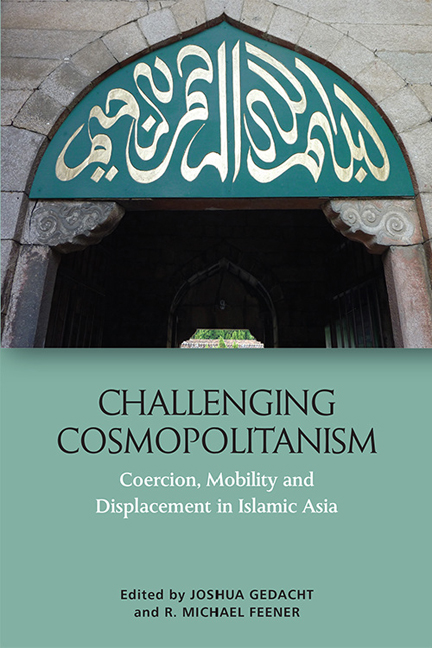Book contents
- Frontmatter
- Contents
- Preface
- 1 Hijra, Ḥajj and Muslim Mobilities: Considering Coercion and Asymmetrical Power Dynamics in Histories of Islamic Cosmopolitanism
- 2 Islamicate Cosmopolitanism from North Africa to Southeast Asia
- 3 Sufi Cosmopolitanism in the Seventeenth-century Indian Ocean: Sharīʿa, Lineage and Royal Power in Southeast Asia and the Maldives
- 4 The White Heron Called by the Muezzin: Shrines, Sufis and Warlords in Early Modern Java
- 5 Variations of ‘Islamic Military Cosmopolitanism’: The Survival Strategies of Hui Muslims during the Modern Period
- 6 Writing Cosmopolitan History in Nineteenth-century China: Li Huanyi’s Words and Deeds of Islamic Exemplars
- 7 The ‘Shaykh al-Islām of the Philippines’ and Coercive Cosmopolitanism in an Age of Global Empire
- 8 Bordering Malaya’s ‘Benighted Lands’: Frontiers of Race and Colonialism on the Malay Peninsula, 1887–1902
- 9 Afghanistan’s Cosmopolitan Trading Networks: A View From Yiwu, China
- Notes on the Contributors
- Index
4 - The White Heron Called by the Muezzin: Shrines, Sufis and Warlords in Early Modern Java
Published online by Cambridge University Press: 01 May 2021
- Frontmatter
- Contents
- Preface
- 1 Hijra, Ḥajj and Muslim Mobilities: Considering Coercion and Asymmetrical Power Dynamics in Histories of Islamic Cosmopolitanism
- 2 Islamicate Cosmopolitanism from North Africa to Southeast Asia
- 3 Sufi Cosmopolitanism in the Seventeenth-century Indian Ocean: Sharīʿa, Lineage and Royal Power in Southeast Asia and the Maldives
- 4 The White Heron Called by the Muezzin: Shrines, Sufis and Warlords in Early Modern Java
- 5 Variations of ‘Islamic Military Cosmopolitanism’: The Survival Strategies of Hui Muslims during the Modern Period
- 6 Writing Cosmopolitan History in Nineteenth-century China: Li Huanyi’s Words and Deeds of Islamic Exemplars
- 7 The ‘Shaykh al-Islām of the Philippines’ and Coercive Cosmopolitanism in an Age of Global Empire
- 8 Bordering Malaya’s ‘Benighted Lands’: Frontiers of Race and Colonialism on the Malay Peninsula, 1887–1902
- 9 Afghanistan’s Cosmopolitan Trading Networks: A View From Yiwu, China
- Notes on the Contributors
- Index
Summary
Seven sayyida sisters await Shaykh Yūsuf al-Maqassārī (henceforth al-Maqassārī) in front of the East Javanese Giri shrine court around 1680. All have similar features and one cannot be told from the other. They pose a challenge to Shaykh Yūsuf, who had long neglected the folklore of Javanese shrine polities on his journey to acquire knowledge of and initiation into the brotherhoods of overseas Islam. This journey took him from his birthplace in Makassar to cosmopolitan ports like Banten and Aceh, and finally to the Islamic heartland of Damascus and Ḥaramayn (i.e., Mecca and Medina). To followers of the Giri shrine, however, the teachings from these seminal religious hubs are relevant only to the extent that they fit into their established framework of Javanese mystic cosmology. Only this cosmology, they maintain, can determine the true friends of God (wali). To test Shaykh Yūsuf's worthiness, the saintly lord of Giri – also known as Puspa Ita – challenges him to point out his wife among the seven sisters in sight. The shaykh only blinks. As he immediately identifies the wife of the Giri lord. Puspa Ita cannot but stutter: ‘Indeed this [shaykh] is a wali’. According to texts from South Sulawesi, it took hovering eggs and parting the Java Sea for al-Maqassārī to reach the Giri court in the first place, but with this final feat his mystical powers (karāmāt) finally proved strong enough to compete with those of the Javanese shrine lords.
This tale derives from South Sulawesian textual traditions which extoll the saintly powers and miracles of Shaykh Yūsuf al-Maqassārī. For nearly two centuries such texts were passed on in Makasar and Bugis households as potent heirlooms. These tales depicted the shaykh as an enchanted figure in ways rather different from how he comes across in the body of Arabic texts in the Islamic religious sciences that he authored during his lifetime. Over the past half century some modern Indonesian writers have directed their attention towards more ‘sober’ aspects of his biography, rather than on his purported performance of miracles. While still hagiographic in nature, these works dismiss perspectives which – as in the anecdote above – reveal parallels between traditional Southeast Asian conceptions of sources of power and authority that were often attributed to both Sufi scholars like al-Maqassārī and saints of magical prowess like Puspa Ita.
- Type
- Chapter
- Information
- Challenging CosmopolitanismCoercion, Mobility and Displacement in Islamic Asia, pp. 81 - 120Publisher: Edinburgh University PressPrint publication year: 2018



